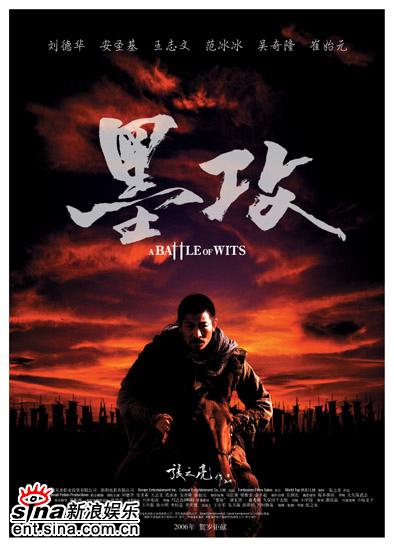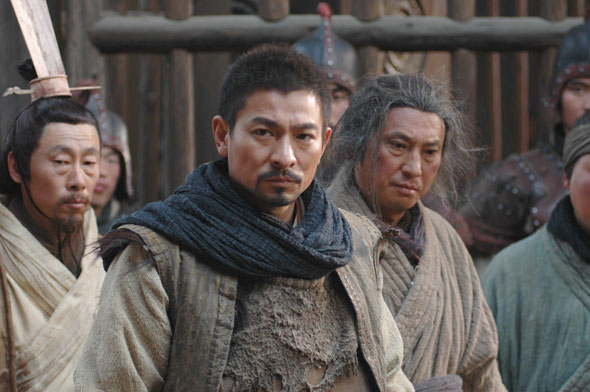
A BATTLE OF WITS
The skinny: During the Warring States period in China, seven great states battled for dominance.
The minor city Liang, which lies between Zhao and Yan, comes under attack by the massive Zhao army led by strategist Xiang Yan Zhong (Ahn Sung Ki).
Tiny, stranded and against overwhelming odds, the small city seeks aid from the Mohists, followers of the philosophy of Mozi and masters of defensive strategies.
But only one Mohist arrives - Ge Li (Andy Lau) - and he has never even defended a city before.
Still, the greatest danger to Liang may not even be the invading enemy, but its own rulers. The review: 'A good fort needs a gap. The enemy must be lured in. So we can attack them. If we only defend, we lose the war.'
In A Battle Of Wits, this is Ge Li's plan.
First, he deliberately leaves the city's south wall vulnerable; second, he allows the enemy within the gates to be slaughtered.
But this is not a quote from this movie. It is actually from another classic with a similar plot.
The film? One of my favourites of all time: Akira Kurosawa's Seven Samurai.
The scale is considerably larger in Battle Of Wits though. It focuses on a city instead of a tiny village; a marauding army instead of roving bandits.

A movie based on a Japanese manga, Battle shares similar themes with Kurosawa's Samurai - the class struggle, idealism versus reactionary forces, the meaning of valour, the value of life, the futility of war.
But Battle has a very different storyline, background and characters. Bloodier and more cruel, it is a no-holds-barred depiction of a struggle between two sides, neither of which can be said to be 'good'.
The film-makers have cleverly appropriated recurring events in Chinese history/folklore - the valiant general undone by a jealous and incompetent ruler, and a conniving, cowardly courtier (think Yue Fei or Jiang Wei of the Three Kingdoms era).
These are sure to resonate with viewers familiar with Chinese history.
But the film is by no means a mindless bloodbath. Is is also introspective, urging us to think deeply.
Is universal love the solution to all our problems, as Mo Zi exhorted? Or is it, as one character puts it, a failure to discern who deserves to be loved?
Morally ambiguous - it rails against war even as it celebrates warrior virtues. Verging on nihilism, it offers no answers.
And while it suffers from some prolonged exposition, it is necessary if only for historical insight into Mohism.
Characters are well sketched and the casting is spot on - Fan Bingbing is lovable as a cavalry woman and Wang Zhiwen is a scene-stealer as the limping king. Nicky Wu, as an archer, is like Legolas, except less annoying.
Battle's main weakness is the few laughable CGI scenes which I hope will be reworked when it's released on DVD.
Apart from this, Battle is thought-provoking, heart-rending, and boasts some breathtaking action.
This is what epic films are supposed to be.
The one scene that justifies the ticket price: Too many. I refuse to pick.
The one scene that will eject you from your seat: Ge Li doing a Tarzan swing.
Best quote: 'Why can't they just surrender? It's the same whoever I pay taxes to.'
Moral of the story: War is futile. - Ho Lian-Yi
news from: The Electric New Paper
The skinny: During the Warring States period in China, seven great states battled for dominance.
The minor city Liang, which lies between Zhao and Yan, comes under attack by the massive Zhao army led by strategist Xiang Yan Zhong (Ahn Sung Ki).
Tiny, stranded and against overwhelming odds, the small city seeks aid from the Mohists, followers of the philosophy of Mozi and masters of defensive strategies.
But only one Mohist arrives - Ge Li (Andy Lau) - and he has never even defended a city before.
Still, the greatest danger to Liang may not even be the invading enemy, but its own rulers. The review: 'A good fort needs a gap. The enemy must be lured in. So we can attack them. If we only defend, we lose the war.'
In A Battle Of Wits, this is Ge Li's plan.
First, he deliberately leaves the city's south wall vulnerable; second, he allows the enemy within the gates to be slaughtered.
But this is not a quote from this movie. It is actually from another classic with a similar plot.
The film? One of my favourites of all time: Akira Kurosawa's Seven Samurai.
The scale is considerably larger in Battle Of Wits though. It focuses on a city instead of a tiny village; a marauding army instead of roving bandits.

A movie based on a Japanese manga, Battle shares similar themes with Kurosawa's Samurai - the class struggle, idealism versus reactionary forces, the meaning of valour, the value of life, the futility of war.
But Battle has a very different storyline, background and characters. Bloodier and more cruel, it is a no-holds-barred depiction of a struggle between two sides, neither of which can be said to be 'good'.
The film-makers have cleverly appropriated recurring events in Chinese history/folklore - the valiant general undone by a jealous and incompetent ruler, and a conniving, cowardly courtier (think Yue Fei or Jiang Wei of the Three Kingdoms era).
These are sure to resonate with viewers familiar with Chinese history.
But the film is by no means a mindless bloodbath. Is is also introspective, urging us to think deeply.
Is universal love the solution to all our problems, as Mo Zi exhorted? Or is it, as one character puts it, a failure to discern who deserves to be loved?
Morally ambiguous - it rails against war even as it celebrates warrior virtues. Verging on nihilism, it offers no answers.
And while it suffers from some prolonged exposition, it is necessary if only for historical insight into Mohism.
Characters are well sketched and the casting is spot on - Fan Bingbing is lovable as a cavalry woman and Wang Zhiwen is a scene-stealer as the limping king. Nicky Wu, as an archer, is like Legolas, except less annoying.
Battle's main weakness is the few laughable CGI scenes which I hope will be reworked when it's released on DVD.
Apart from this, Battle is thought-provoking, heart-rending, and boasts some breathtaking action.
This is what epic films are supposed to be.
The one scene that justifies the ticket price: Too many. I refuse to pick.
The one scene that will eject you from your seat: Ge Li doing a Tarzan swing.
Best quote: 'Why can't they just surrender? It's the same whoever I pay taxes to.'
Moral of the story: War is futile. - Ho Lian-Yi
news from: The Electric New Paper


















<< Home